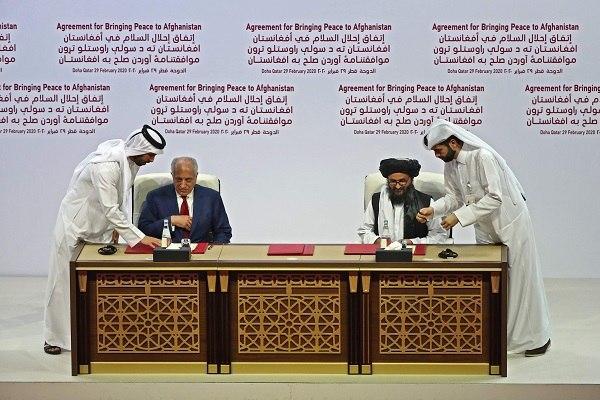Nearly twenty years after the US invasion of Afghanistan which resulted in toppling the Taliban rule, the United States of America signed a peace deal with the Taliban which is titled as Agreement for Bringing Peace to Afghanistan. The signing ceremony took place on Saturday, February 29 in Doha, capital of Qatar, in the presence of high profile representatives from Pakistan, Qatar, Turkey, India, Indonesia, Uzbekistan and Tajikistan.
The agreement, however, has raised a mixed feeling and reaction among ordinary Afghans who stormed social and mass media to express their happiness for peace, concerns about a Taliban comeback, and worries over a possible loss of achievements made after the collapse of the Taliban regime.
“If the deal succeeds the Taliban will rule the country partially and no national [Afghan] power will be able to stand against this project [peace deal],” wrote Kawa Jobran on his Facebook account, noting that the agreement is a Taliban victory against the US and Afghan political factions.
Some naysayers of the deal in the capital Kabul are lambasting at the US, saying that the deal gives the upper hand to the Taliban who are hardliners in principal and zealous radicals by ideology.
Ali Amiri, a university lecturer, illustrates a very tough path for making peace between the Afghan political parties, civil society, ordinary Afghans, war victims, and the Taliban. Noting that it is too hard for the Taliban to setback from their demands, he says, “What will happen to freedom of speech and human rights values? Will the war end or not? Are the Taliban ready to make sacrifices for peace?”
Mr. Amiri seems to be true on the difficulty of the process when it comes to intra-Afghan peace talks as the trouble popped up very quickly just a day after the agreement was signed over a key component of the agreement.
Appearing in a press conference today, March 01, President Ghani said that the Afghan government has no commitment to release 5,000 Taliban prisoners and he has shared it repeatedly with the US Special Representative for Afghanistan Reconciliation, Zalmay Khalilzad.
Under the deal, 5,000 Taliban prisoners are agreed to be released in exchange with up to 1,000 prisoners of Afghan security forces by March 10, 2020, the first day of intra-Afghan negotiations.
Sima Samar, former chairwoman of Afghanistan Independent Human Rights Commission (AIHRC) who secretly ran education programs for girls during the Taliban rule, is now optimistic about the way forward after US-Taliban peace agreement. “Human rights and victims will not be ignored. The process will end up with sustainable peace in the country,” she said in a series of tweet.
The chairwoman of AIHRC, Shahrzad Akbar, however, believes that the US-Taliban peace deal will not bring peace to Afghanistan. She says that it will require much more from US, Afghanistan allies, the region, and from Afghans. “It will not end the war and bloodshed. It is an important but fragile first step towards political resolution of the current conflict in Afghanistan,” Mrs. Akbar adds on his official twitter account.
Under the Taliban rule (1996-2001), women were denied from the very basic rights. Not only they were forbidden to get education or work outside, Afghan women were strictly prohibited from going out without a male companion.
“I am strongly concerned,” Laila Mohammadi, a women rights activist, writes on her Facebook noting that none of the values like Afghanistan’s fragile democracy, social justice, and women rights are no longer seen as a priority for the United States.
According to Maryam Mehtar, a Kabul based female journalist, the US-Taliban agreement paves the ground for formation of a dictatorship in Afghanistan. To further sink in, she says that the women will suffer more than any other community of the society under such a dictator rule.
“Peace is a longtime dream of the Afghan people and we appreciate any step for fulfilling this dream,” Zia Sadiq stated on his Facebook account, noting that the people’s hopes, dreams, concerns, and achievements made in past two decades need to be considered in the peace deal.
On Saturday, February 29, the United States of American signed a deal with the Taliban insurgents. Under the deal, the US have agreed to pull out all its forces from the country within 14 months. In return, the Taliban have promised not to let extremists to jeopardize America’s interests and the interests of Washington’s allies from Afghan soil. The Taliban have also agreed to sit with the Afghan government and political factions to discuss a post-negotiation setup.




